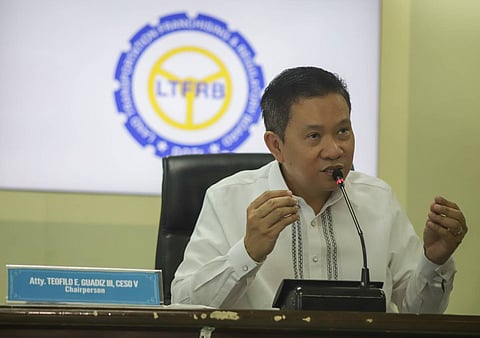
- NEWS
- the EDIT
- COMMENTARY
- BUSINESS
- LIFE
- SHOW
- ACTION
- GLOBAL GOALS
- SNAPS
- DYARYO TIRADA
- MORE

The Land Transportation Franchising and Regulatory Board (LTFRB) said Saturday it has made significant strides in modernizing public transportation in 2024, marking a pivotal year for the agency.
LTFRB chairman Atty. Teofilo Guadiz III said the agency celebrated numerous achievements aligned with the government’s vision of a safer, more efficient, and environmentally sustainable transport system.
He explained that central to the LTFRB’s efforts was the consolidation of public utility vehicles (PUVs) under the Public Transport Modernization Program (PTMP), launched in 2017.
By year-end, 85.6 percent of PUV units — totaling 164,137 — had been consolidated into modernized fleets, marking a big accomplishment after seven years of extensions, Guadiz pointed out.
“This is considered a milestone, not just for the LTFRB, but for the entire government. Despite objections, strikes, and calls to suspend the program, we remain committed to modernization,” Guadiz stated.
He said that franchise consolidation and route rationalization played key roles, optimizing transport availability and reducing inefficiencies in Metro Manila and other urban areas.
Temporary extensions were likewise granted to operators who failed to meet consolidation deadlines, ensuring continued service while adhering to modernization goals, the LTFRB chief said.
He added that the LTFRB also expanded the ride-hailing market by accrediting new transport network companies bringing the total to 20.
The move increased commuter options and competition in the transport sector. Platforms like Angkas gained accreditation, reflecting the agency’s support for innovation, he pointed out.
Additionally, the LTFRB approved a P10 increase in taxi flag-down rates, raising them to P50. Further fare adjustments are under review, balancing operator demands and inflation concerns.
The agency maintained that it had enhanced its support programs for workers affected by modernization, including initiatives like “EnTSUPERneur” and “Tsuper Iskolar.”
The programs offered financial aid and training, helping transport workers transition to new opportunities.
While the modernization program faced protests and transport strikes, the LTFRB maintained operations by organizing alternative transport services, Guadiz said
Safety was also prioritized through stricter vehicle inspections and higher standards for modernized fleets, he averred.
Likewise, the LTFRB pushed environmental sustainability by incorporating advanced, low-emission technologies into modernized PUVs.
